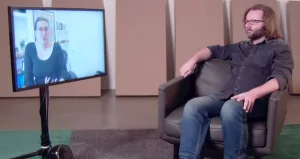Ken Greenberg delves into the transformative impact of technology on urban landscapes, threading his discourse with both optimism and caution. Opening with an assertion that technology should fundamentally serve humanity, Greenberg sets the tone for a reflective and critical exploration of our technological dependencies. He raises an essential query—whether the pervasive, rapid digitalization we are embracing is unequivocally beneficial.
Through a historical lens, Greenberg recounts the automobile’s ascension in urban planning and its profound but often detrimental effects on city structures and social health. He connects these historical precedents to today’s tech-dominated scenario, emphasizing the need for a balanced, critically aware approach to incorporating new technologies into urban environments.
Greenberg’s cautionary tale focuses on the unchecked embrace of automobiles post-World War II, which reshaped North American cities around suburban sprawl, leading to a host of unforeseen social and health issues. Drawing parallels, he critiques the contemporary rush towards digital solutions which potentially sideline human interactions and community cohesion.
The talk also covers the shifts in public perception and urban planning that are beginning to favor mixed-use, pedestrian-friendly environments over car-centric urban sprawl. Greenberg champions a vision of urbanism where technology enhances rather than undermines human-centric values. His narrative is punctuated with examples from his personal and professional experiences, reinforcing the necessity for cities to reassess and potentially recalibrate their embrace of both old and new technologies to foster environments that prioritize human wellbeing alongside technological advancement.
Presented by Artengine and Impact Hub Ottawa in partnership with the National Capital Commission Urbanism Lab
A trio of keynote speakers kicked-off the Future Cities Forum including science-fiction writer and futurist Madeline Ashby, urban designer Ken Greenberg, and professor Tracey Lauriault, a researcher who specializes in big data and the city.
This diverse group shared their speculations on future cities in the context of emerging and disruptive technologies. How will and can we adapt the key lessons of urban design of the twentieth century and not be seduced by the same techno-utopianism that shaped cities in the past? As we are transformed and extended into the network, how will a citizen be in public or private in our new data-driven city? Who will be the heroes and anti-heroes of the cities to come?
Ken Greenberg is an urban designer, teacher, writer, former Director of Urban Design and Architecture for the City of Toronto and Principal of Greenberg Consultants.
For over four decades he has played a pivotal role on public and private assignments in urban settings throughout North America and Europe, focusing on the rejuvenation of downtowns, waterfronts, neighborhoods and on campus master planning, regional growth management, and new community planning. His work sits at the intersection of urban design, architecture, landscape, mobility, social and economic development. Cities as diverse as Toronto, Hartford, Amsterdam, New York, Boston, Montréal, Ottawa, Edmonton, Calgary, St. Louis, Washington DC, Paris, Detroit, Saint Paul and San Juan Puerto Rico have benefited from his advocacy and passion for restoring the vitality, relevance and sustainability of the public realm in urban life. In each city, with each project, his strategic, consensus-building approach has led to coordinated planning and a renewed focus on urban design. He is the recipient of the 2010 American Institute of Architects Thomas Jefferson Award for Public Design Excellence and the 2014 Sustainable Buildings Canada Lifetime Achievement Award. He was selected as a Member of the Order of Canada in 2020 and was awarded a Doctor of Laws, honoris causa from the University of Toronto. In 2023 he was appointed as Vice Chair, Advisory Committee on Planning, Design and Reality, (ACPDR), National Capital Commission,Ottawa.
My optimistic hypothesis is that there can be such a thing as a human-centered use of technology.

Dames Making Games (DMG) founder Izzie Colpitts-Campbell speaks with us about her art and design practice and how her role as a community organizer influenced her contributions to the DEL. In this conversation we discuss her new DMG project Damage Labs, similarities between game design and community organizing, and how artist solidarity can be provoked digitally.